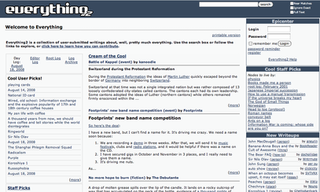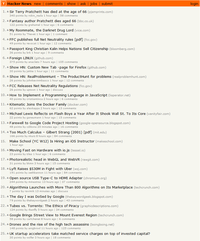Slashdot is a social news website that originally billed itself as "News for Nerds. Stuff that Matters". It features news stories on science, technology, and politics that are submitted and evaluated by site users and editors. Each story has a comments section where users can add online comments.
Spamdexing is the deliberate manipulation of search engine indexes. It involves a number of methods, such as link building and repeating related and/or unrelated phrases, to manipulate the relevance or prominence of resources indexed in a manner inconsistent with the purpose of the indexing system.

Advogato was an online community and social networking site dedicated to free software development and created by Raph Levien. In 2007, Steve Rainwater took over maintenance and new development from Raph. In 2016, Rainwater's running instance was shut down and backed up to archive.org.

An Internet forum, or message board, is an online discussion site where people can hold conversations in the form of posted messages. They differ from chat rooms in that messages are often longer than one line of text, and are at least temporarily archived. Also, depending on the access level of a user or the forum set-up, a posted message might need to be approved by a moderator before it becomes publicly visible.
Open-source journalism, a close cousin to citizen journalism or participatory journalism, is a term coined in the title of a 1999 article by Andrew Leonard of Salon.com. Although the term was not actually used in the body text of Leonard's article, the headline encapsulated a collaboration between users of the internet technology blog Slashdot and a writer for Jane's Intelligence Review. The writer, Johan J. Ingles-le Nobel, had solicited feedback on a story about cyberterrorism from Slashdot readers, and then re-wrote his story based on that feedback and compensated the Slashdot writers whose information and words he used.
Spam in blogs is a form of spamdexing which utilizes internet sites that allow content to be publicly posted, in order to artificially inflate their website ranking by linking back to their web pages. Backlinking helps search algorithms determine the popularity of a web page, which plays a major role for search engines like Google and Microsoft Bing to decide a web page ranking on a certain search query. This helps the spammer's website to list ahead of other sites for certain searches, which helps them to increase the number of visitors to their website.
Plastic.com (2001–2011) was a general-interest internet forum running under the motto 'Recycling the Web in Real Time'.
SlashNET is a medium-sized, independently operated Internet Relay Chat (IRC) network. Originally sponsored by Slashdot and founded in 1998, in 1999 SlashNET split off to become its own entity. A few well-known communities and projects maintain an IRC presence at SlashNET, including #g7, #totse (Totse), #idiots-club, #mefi, various Penny Arcade-related communities, #Twitterponies, and #rags. As of 2012 it is ranked in the top 40 networks by IRC.Netsplit.de, with an estimated relatively constant 1700 users, and #25/737 by SearchIRC.com.
An anonymous post, is an entry on a textboard, anonymous bulletin board system, or other discussion forums like Internet forum, without a screen name or more commonly by using a non-identifiable pseudonym. Some online forums such as Slashdot do not allow such posts, requiring users to be registered either under their real name or utilizing a pseudonym. Others like JuicyCampus, AutoAdmit, 2channel, and other Futaba-based imageboards thrive on anonymity. Users of 4chan, in particular, interact in an anonymous and ephemeral environment that facilitates rapid generation of new trends.

Adequacy.org was a satirical web site. It featured articles on politics, religion, technology, history, and sociology, as well as the "Linux Zealot" cartoon series. The site shut down on September 11, 2002, but has since made its archives available.
A social news website is a website that features user-posted stories. Such stories are ranked based on popularity, as voted on by other users of the site or by website administrators. Users typically comment online on the news posts and these comments may also be ranked in popularity. Since their emergence with the birth of Web 2.0, social news sites have been used to link many types of information, including news, humor, support, and discussion. All such websites allow the users to submit content and each site differs in how the content is moderated. On the Slashdot and Fark websites, administrators decide which articles are selected for the front page. On Reddit and Digg, the articles that get the most votes from the community of users will make it to the front page. Many social news websites also feature an online comment system, where users discuss the issues raised in an article. Some of these sites have also applied their voting system to the comments, so that the most popular comments are displayed first. Some social news websites also have a social networking service, in that users can set up a user profile and follow other users' online activity on the website.

Fark is a community website created by Drew Curtis that allows members to comment on a daily batch of news articles and other items from various websites. The site receives many story submissions per day and approximately 100 of them are publicly displayed on the site, spread out over the main page as well as topical tabs that are organized as entertainment, sports, geek, politics and business). Curtis says the stories are selected without intentional political bias, but that he tries to run both far-left and far-right articles.

Digg is an American news aggregator with a curated front page, aiming to select articles specifically for the Internet audience such as science, trending political issues, and viral Internet issues. It was launched in its current form on July 31, 2012, with support for sharing content to other social platforms such as Twitter and Facebook.
Lawrence Calvin Foster III, commonly known as Rusty Foster, is an American media critic and programmer. He has been described as "something of a Zelig-like figure in internet history, popping up in key roles at various stages in the web’s development." He is the author of Today in Tabs, the founder of Kuro5hin, and the creator of Scoop, a collaborative media application used by several websites. He also helped develop Scripto, the screenwriting software company founded by Stephen Colbert.

Jeff Bates, also known as hemos, is the co-founder of Slashdot along with Rob Malda ("CmdrTaco").

Everything2 is a collaborative online community consisting of a database of interlinked user-submitted written material. E2 is moderated for quality, but has no formal policy on subject matter. Writing on E2 covers a wide range of topics and genres, including encyclopedic articles, diary entries, poetry, humor, and fiction.
The Slashdot effect, also known as slashdotting, occurs when a popular website links to a smaller website, causing a massive increase in traffic. This overloads the smaller site, causing it to slow down or even temporarily become unavailable. Typically, less robust sites are unable to cope with the huge increase in traffic and become unavailable – common causes are lack of sufficient data bandwidth, servers that fail to cope with the high number of requests, and traffic quotas. Sites that are maintained on shared hosting services often fail when confronted with the Slashdot effect. This has the same effect as a denial-of-service attack, albeit accidentally. The name stems from the huge influx of web traffic which would result from the technology news site Slashdot linking to websites. The term flash crowd is a more generic term.

Hacker News (HN) is a social news website focusing on computer science and entrepreneurship. It is run by the investment fund and startup incubator Y Combinator. In general, content that can be submitted is defined as "anything that gratifies one's intellectual curiosity."
Social spam is unwanted spam content appearing on social networking services, social bookmarking sites, and any website with user-generated content. It can be manifested in many ways, including bulk messages, profanity, insults, hate speech, malicious links, fraudulent reviews, fake friends, and personally identifiable information.
Amavis is an open-source content filter for electronic mail, implementing mail message transfer, decoding, some processing and checking, and interfacing with external content filters to provide protection against spam and viruses and other malware. It can be considered an interface between a mailer and one or more content filters.








